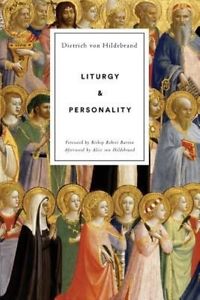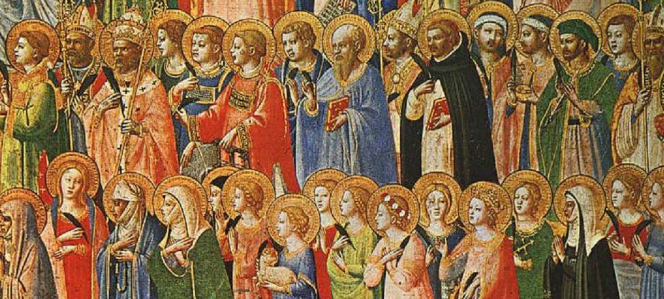Written in 1932 in the space of just twenty-three days and published in Germany the following year, Liturgy and Personality is one of the most influential and beloved books by seminal philosopher Dietrich von Hildebrand.
A classic work of Catholic thought and culture, Liturgy and Personality is the culmination of several years of intense study following Hildebrand’s conversion to the Catholic Church in 1914.
“In this book, Dietrich von Hildebrand shows how the Liturgy (when it is approached with the proper attitude and prayed reverently) brings about a profound development, transforming even a modest personality into a great one,” writes Alice von Hildebrand, widow of Dietrich.
Bishop Robert Barron has called Hildebrand “one of the truly great personalities of the twentieth century,” and wrote in his Foreword to the new edition: “At a time when so many have lost a feel for the Mass, this reissue of Liturgy and Personality will prove of inestimable value.”
Today we share Bishop Barron’s entire Foreword to Liturgy and Personality and encourage you to pick up your copy of the book today.
Dietrich von Hildebrand was one of the truly great personalities of the twentieth century. I don’t mean, of course, that he was a celebrity or a bon vivant or a favorite of gossip columnists and talk show hosts. I am using the term as Hildebrand himself used it, to designate a person who responds authentically to value, someone in possession of a refined and properly ordered soul. One sensed the greatness of Hildebrand’s personality not only in his generous response to a whole range of objective goods — artistic, moral, and above all religious — but also in his fierce and principled resistance to a variety of disvalues. Nowhere was this opposition to evil more apparent than in his years-long battle against Hitler and his Nazi ideology. It is to von Hildebrand’s infinite credit that, at one point in the late 1930s, he was designated as Hitler’s number one opponent.
 The principle point of the book you are about to read is that the liturgy of the Church decisively shapes a healthy personality. Hildebrand insists throughout the text that the primary purpose of the liturgy is not to form the personality but to give proper praise to God, the supreme value. Nevertheless, precisely by ordering human beings so thoroughly to
The principle point of the book you are about to read is that the liturgy of the Church decisively shapes a healthy personality. Hildebrand insists throughout the text that the primary purpose of the liturgy is not to form the personality but to give proper praise to God, the supreme value. Nevertheless, precisely by ordering human beings so thoroughly to
God, the liturgy does in fact, as a derivative effect, contribute to their flourishing. How important this theme is at a time when skepticism regarding objective value reigns and when the Mass is so often construed as a celebration of the worshipping community.
In order to grasp Hildebrand’s central argument, we have to be clear about what he means by “value,” and in order to come to that clarity, we have to distinguish between what he calls “the merely subjectively satisfying” and the “objectively valuable.” There are certain things that are good in the measure that they fulfill some basic desire or need. Especially when I am hungry, I find a deep-dish pizza appealing; when I am cold and tired, a warm bed is attractive indeed; when I seek some practical end, I might find a well-organized political party useful to me. The pizza, the comfortable bed, and the political organization all belong to the realm of the subjectively satisfying, and this means that the ego appropriately bends them to its purpose, “taking advantage” of them.
But beyond this dimension lies the arena of objective values. These are things, events, works of art, persons, and so on, that possess an intrinsic excellence, a preciousness, a splendor and luminosity. They are not bent to the ego’s purpose, but rather, they bend the ego to their purpose. By their very beauty and nobility, they demand a response on the part of those who perceive them; they shape and rearrange the subjectivities of those who behold them. In regard to the merely subjectively satisfying, we could legitimately speak of personal taste or individual preference, but in regard to objective values, such language would be inappropriate. It would be anomalous if someone, having taken in the Sistine Chapel ceiling, were to say, “It’s just not the kind of painting I like.” It would be sur- passing strange if someone, having heard the story of St. Maximilian Kolbe’s self-sacrifice at Auschwitz, were to say, “I just don’t care for that sort of thing.” Authentic values claim the subject and demand from him a response.
For von Hildebrand, the indispensable and fundamental element in the formation of a true personality is “intentional contact with the world of values.” This means a response of mind (“It is true”), will (“It is good”), and heart (“I delight in it”) to the whole range of objective values. Now all values — from Mozart’s operas to Gothic cathedrals to splendid moral acts — are but participations in and reflections of the unsurpassable value of God. Therefore, to be a personality in full, one must, above all, be suited to make a value-response to God—and this brings us to the threshold of the liturgy.
Every aspect and dimension of the Church’s formal prayer serves to order the worshipper rightly to the supreme value. The reverential language of the liturgy, for instance, convinces us that “all easy familiarity” is inappropriate in regard to God; it also inculcates, as a consequence, an attitude of reverence for one’s own body, even for the purity of matter itself. The radical theocentrism of the liturgy teases us sinners out of our native egocentrism and thereby prepares us to see even created values with fresh eyes. A proud or concupiscent person will appreciate things only inasmuch as they serve his purposes, but a person formed by the liturgy will see things as repositories of value. Here are Hildebrand’s own words: “It is above all a sign of deficiency in depth and breadth when a man thinks more of goods which merely procure pleasure…than of goods providing spiritual happiness.”
A theme amply developed in the course of this book is that of spiritual awakenedness. To be a true personality is to be awake to the values, both natural and supernatural, that regularly present themselves. The average man, Hildebrand argues, “wades through life in a state of spiritual inertia,” even if he is of agile mind and alert to practical exigencies. Through its distinctive language, gestures, and symbolism, the liturgy compels us to open our minds to the moral and spiritual dimensions of life and finally to open our hearts to hear the voice of God. Nowhere is this call to awakenedness clearer than in the language of the Easter liturgy: “Seek the things that are above, where Christ is sitting at the right hand of God; taste the things that are above, not the things that are upon the earth.”
Another motif that Hildebrand develops is that of discretio (discretion) in the liturgy. In both the natural and supernatural orders, Hilde- brand contends, values often disclose themselves gradually, unfolding according to an inner rhythm. This is true of plants, friendships, and the self-disclosure of God. One of the unhappy marks of the modern person is a tendency impatiently to ignore this process and hence to do violence to the “objective logos of things.” In its solemn, gradual, and patient unfolding of the mystery of God, the liturgy of the Church beautifully inculcates discretio.
First published in 1933, at the height of the “liturgical movement” in Europe and America, this splendid text functions as a fine interpretive key to Sacrosanctum concilium, the Vatican II document on the liturgy, and to Pope Benedict XVI’s liturgical reflections. At a time when so many have lost a feel for the Mass, this reissue of Liturgy and Personality will prove of inestimable value.
